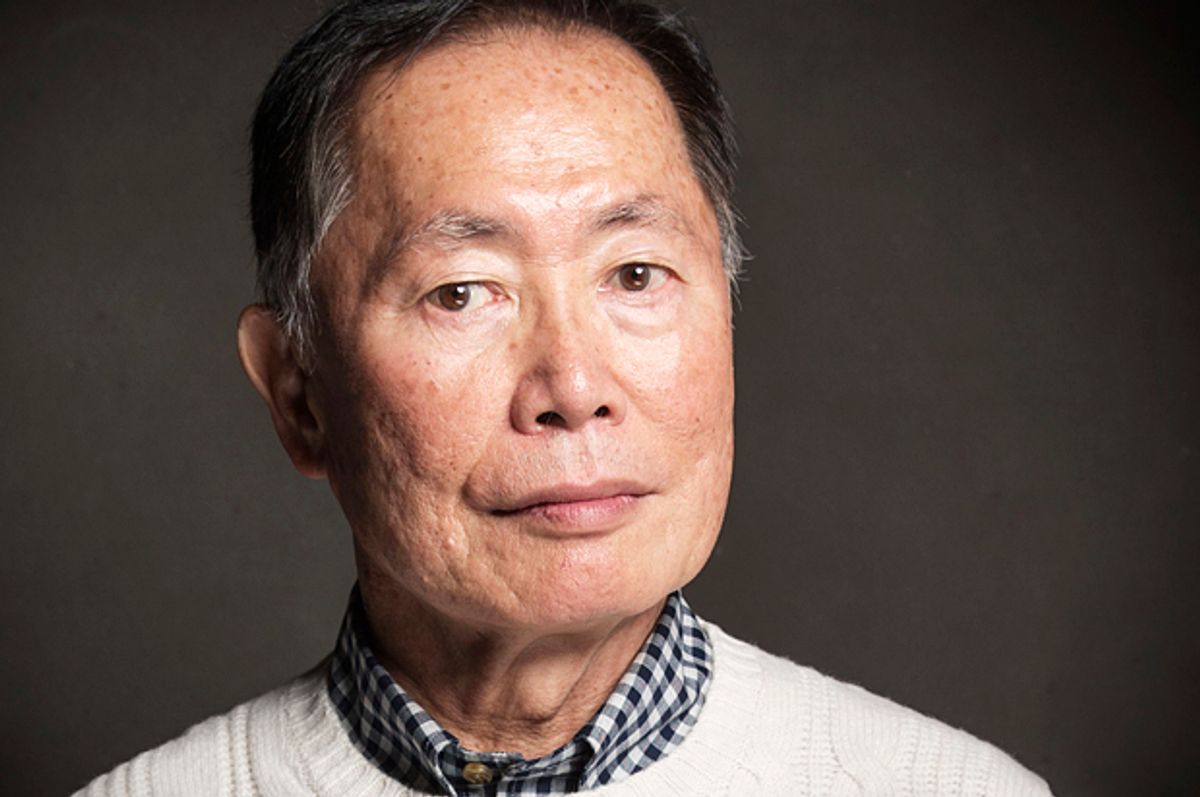In November 2017, "Star Trek" icon and activist George Takei was accused of sexual assault, stemming from an incident that allegedly took place in 1981. The report was first published by The Hollywood Reporter (THR). Later, Scott Brunton, the former model who accused Takei, said he was also drugged by the actor.
One writer, Shane Snow, spent months investigating these claims, as well as interviewing Brunton, experts and many people who know Takei. The result is a detailed and lengthy article published in the Observer that challenges many of the most damning details against Takei. His takeaway is: "We — both public and press— got the George Takei assault story wrong."
Snow focuses on the inconsistencies in Brunton's story, as told to different outlets once the THR exposé went viral. "Brunton didn’t appear to mention being drugged until two days after the THR story, following Takei’s public denial," Snow wrote. "And then, in a CNN interview, he confusingly didn’t recount any groping."
After the THR story, it was Twitter users who assumed Brunton was drugged because of his description that, after having two drinks at Takei's apartment, he tried to stand up and felt dizzy. He said Takei led him to a bean bag chair, and either he briefly lost consciousness or experienced a short memory brownout. Brunton said after the alleged groping, he was able to sober up and drive home and did not suffer from a hangover the next day.
But, after Takei denied the allegations from the THR story, Brunton told The Oregonian: "I know unequivocally he spiked my drink."
To Snow, Brunton said, "I thought it was just I was drunk . . . I didn’t even start thinking that until years later when they started talking about date rape drugs – and then Cosby and all."
When Snow shared the information with two toxicologists, both immediately concluded that Brunton's drinks were not spiked. "The alcohol alone, if drunk quickly, could account for [his browning out], particularly if there was a bit of postural hypotension," date-rape expert Michael Scott-Ham of Principal Forensic Toxicology & Drugs, a consulting firm in London, told Snow. "To recover so speedily doesn’t sound like the actions of a drug."
After Snow shared the conclusions from the toxicologists, Brunton apparently conceded and said of Takei, "It makes him a little less sinister."
Then, Snow dived into the groping claim, one which he said Brunton vacillated on to the several publications he spoke to. Snow asks:
"Did he touch your genitals?"
"You know . . . probably . . ." Brunton replied after some hesitation. "He was clearly on his way to . . . to . . . to going somewhere."
We shared a pause.
"So . . . you don’t remember him touching your genitals?"
Brunton confessed that he did not remember any touching.
In Brunton's recollection, he said that, all of sudden, his pants were down and Takei was pulling on his underwear, to which Brunton said he did not want to have sex. He said Takei replied, "I am trying to make you comfortable." But Brunton shoved him saying, "No."
Former Senior Deputy District Attorney Ambrosio Rodriguez, who prosecuted rapists and molesters in California, told Snow, "There’s nothing to prosecute here," after hearing about the night in detail. "People get drunk on dates and take off each other’s pants all the time."
Rodriguez told Snow that it is the actions that follow that are critical for legal ramifications. "The crucial detail in the context of a consensual date with two adults who are drinking, he said, is that when the man who made the advance was denied consent, he backed off," Snow writes. "Making a move itself is not a crime," Rodriguez said.
Snow then dove into other details, such as the culture of the Los Angeles gay nightclub scene where Brunton and Takei met and the difference between the lone accusation against Takei and the long-known industry reputations of accused celebrity predators like Bill Cosby and Harvey Weinstein, including their history of legal settlements.
He also shared some offensive statements from Brunton about Takei and how he oft told the encounter not as a story of trauma, but as "a great party story."
"I rarely thought of it," Brunton said. "He was 20 years older than me and short. And I wasn’t attracted to Asian men." He added, "I was a hot surfer, California boy type that he probably could have only gotten had he bought, paid for or found someone just willing to ride on his coattails of fame."
Brunton said the alleged assault was "not painful . . . It didn’t scar me," but that he decided to come forward after Takei criticized Kevin Spacey for announcing his sexuality as a way to deflect from a pedophilia accusation. Mostly, Brunton told Snow, he just wanted an apology.
There are many more details, but Snow's thesis is about more than Takei or this single accusation. Snow reminds readers that the exposés on Harvey Weinstein in the New York Times and the New Yorker were done over many months and with exhaustive reporting, fact-checking and corroboration.
"But, once that dam broke, the power of and interest in these stories has led to an incentive for the press to get them out quickly and for our polarized social media to quickly weaponize them," Snow writes. "It’s easy to forget that every story has its own subtleties and nuances, and the consequences for getting things wrong can be severe."
He added, "We owe it to both the victims and the accused to investigate all sides of a story before we unleash it for the masses to devour."



Shares